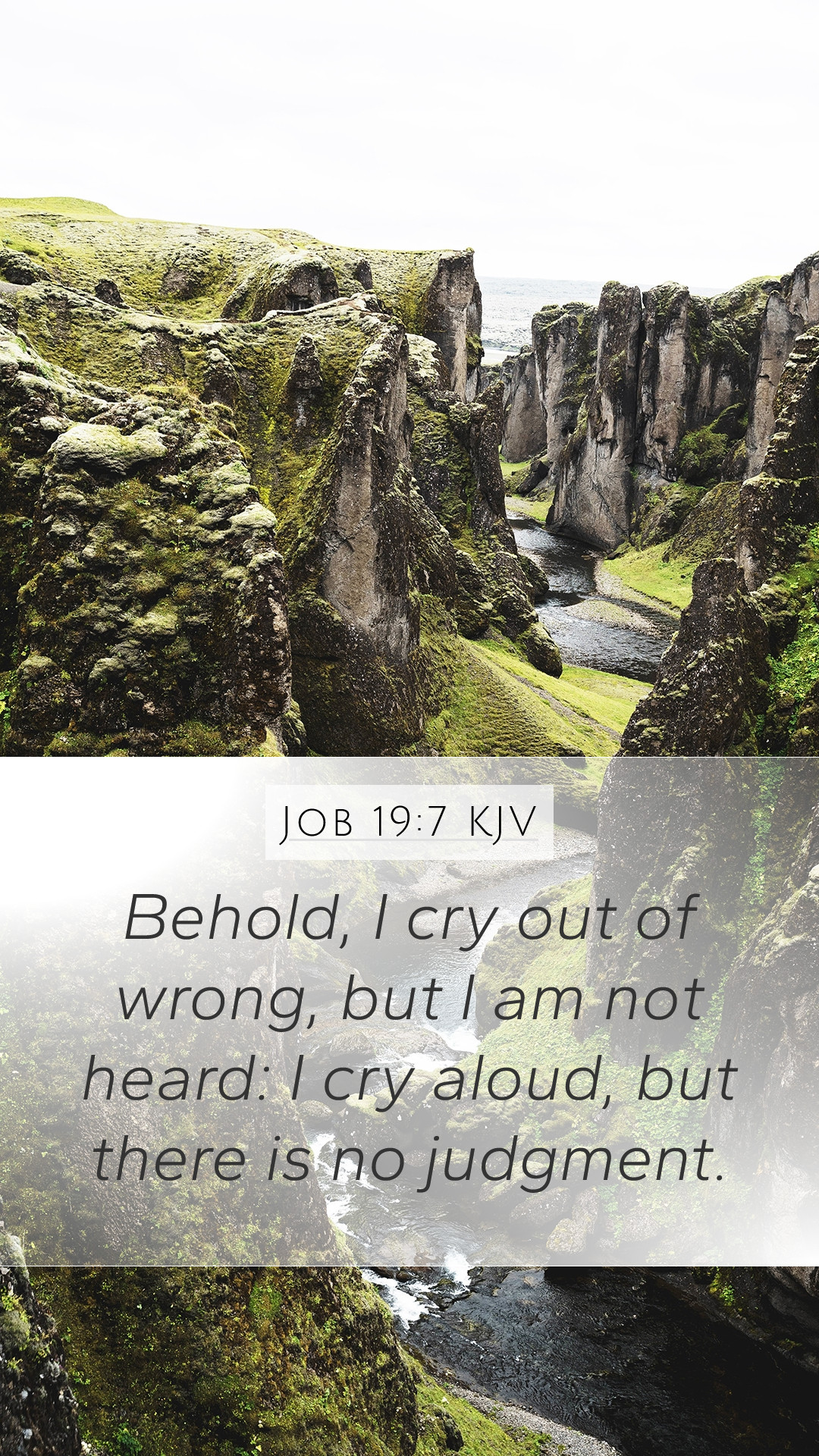Old Testament
Genesis Exodus Leviticus Numbers Deuteronomy Joshua Judges Ruth 1 Samuel 2 Samuel 1 Kings 2 Kings 1 Chronicles 2 Chronicles Ezra Nehemiah Esther Job Psalms Proverbs Ecclesiastes Song of Solomon Isaiah Jeremiah Lamentations Ezekiel Daniel Hosea Joel Amos Obadiah Jonah Micah Nahum Habakkuk Zephaniah Haggai Zechariah MalachiJob 19:7 Meaning
What is the meaning of Job 19:7?
Behold, I cry out of wrong, but I am not heard: I cry aloud, but there is no judgment.
Job 19:7 Bible Verse Meaning
Understanding Job 19:7
Job 19:7 states: "Behold, I cry out of wrong, but I am not heard: I cry aloud, but there is no judgment."
Overview of Job 19:7
This verse encapsulates Job's profound sense of injustice and despair in his plight. Job, a man of great integrity and suffering, seeks a hearing for his grievances against God and longs for justice in the face of his overwhelming affliction.
Commentary Insights
-
Matthew Henry:
Matthew Henry emphasizes the depth of Job's lament, noting how it illustrates the feeling of abandonment in times of suffering. He points out that Job's cries represent a genuine desire for vindication, and highlights the importance of seeking God earnestly, even when one feels unheard.
-
Albert Barnes:
Albert Barnes provides an analysis of the term "wrong" in this verse, indicating that Job expresses a strong sense of injustice. He explains that Job's assertions reflect the anguish that arises from feeling neglected by the divine presence and justice.
-
Adam Clarke:
Adam Clarke discusses the cultural context of the verse, elaborating on the judicial practices of the time. He stresses Job's frustration over the apparent absence of justice, paralleling it with the universal human experience of feeling overlooked in moments of distress.
Thematic Analysis
This verse touches on several key themes relevant to both personal suffering and divine justice:
- Injustice: Job articulates a deep sense of injustice, making it clear that he feels wronged without recourse to legal remedy.
- Divine Silence: The lack of response from God during his cries highlights a theme of divine silence in human suffering, prompting questions about God's presence and attentiveness.
- Seeking Justice: Job's pleas accentuate the desire for God to act justly in the face of human adversity, serving as an exhortation for those undergoing trials.
Application to Daily Life
For believers today, Job 19:7 serves as a poignant reminder that:
- Expressing Grief: It is healthy to express feelings of grief, injustice, and despair before God, knowing that He listens.
- Enduring Trials: The verse encourages endurance in trials, reinforcing the notion that even when God appears silent, He is still present.
- Seeking Truth and Justice: Believers are called to seek truth and justice, trusting that God will ultimately bring about resolution and vindication in His timing.
Related Scripture References
- Psalms 22:1: "My God, my God, why have you forsaken me?" – Reflecting a similar cry of abandonment.
- Psalms 94:1: "O Lord God, to whom vengeance belongs." – A plea for justice against the oppressed.
- Isaiah 40:27: "My way is hidden from the Lord, and my just claim is passed over by my God." – Expressing feelings of neglect and injustice.
Conclusion
Job 19:7 speaks profoundly to the human experience of suffering and the quest for justice. Its layers of meaning offer rich insights for Bible study groups, online Bible study tools, and personal reflection. Understanding this verse can facilitate deep biblical exegesis and applications in daily life, promoting an enduring faith even when justice seems distant. Through such scripture analysis, believers can find solace and courage, affirming the ultimate justice of God.
As we engage with this text, let us explore the meaning of Bible verses like Job 19:7 and examine their significance through communal study and personal reflection.


